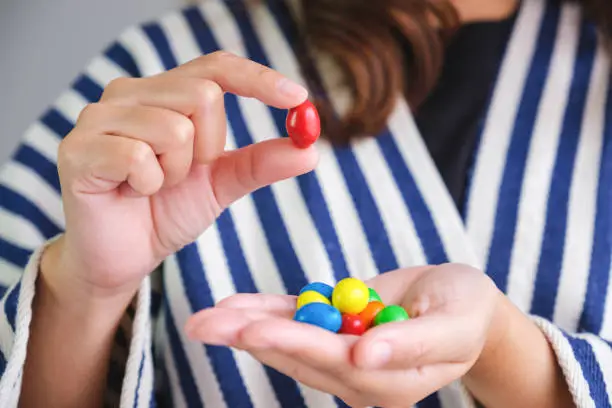Children all around the world suffer from Attention-Deficit Hyperactivity Disorder (ADHD), a neurodevelopmental disorder that impairs their levels of activity, impulse control, and attention span. A diversified strategy, involving behavioral treatment, lifestyle modifications, and occasionally medication, is frequently needed to manage ADHD in children. However, natural treatments including vitamins and supplements have shown promise in efficiently managing symptoms of ADHD.
In order to enhance focus, mood, and general well-being, this article examines the top ten scientifically supported ADHD vitamins and supplements for kids. We’ll go over the advantages of supplements, how they function, and factors parents should take into account when selecting one. We’ll also go over frequently asked questions concerning natural remedies for ADHD.
How Do Supplements Support ADHD Symptom Management in Children
ADHD is frequently associated with nutritional imbalances, inadequacies, or the body’s incapacity to properly regulate vital vitamins and minerals. Supplements have a big impact on:
- Enhancing Concentration and Focus: Specific foods support increased neurotransmitter activity and brain function.
- Mood and Behavior Balancing: Minerals and vitamins like zinc and magnesium can help control impulsive behavior and mood swings.
- Supporting Relaxation and Sleep : Magnesium and melatonin help children sleep better, which is crucial for controlling the symptoms of ADHD.
- Encouraging Brain Development: Neural development and cognitive function depend on omega-3 and omega-6 fatty acids.
Supplements can enhance the quality of life for children with ADHD and supplement ADHD therapy, but they should not be used in place of traditional treatment.
1. Melatonin
The brain naturally produces the hormone melatonin to control sleep cycles. Sleep disruptions are common in children with ADHD, and they can exacerbate symptoms like hyperactivity and irritability.
Melatonin’s advantages for children with ADHD
- enhances the onset and quality of sleep.
- improves concentration throughout the day by lowering daytime weariness.
- helps maintain a regular sleep schedule, which is essential for managing ADHD symptoms.
How to Apply: Before using melatonin supplements, start with a low dose (0.5–1 mg) and speak with your child’s pediatrician.
2. Omega-3 and Omega-6 Fatty Acids
Fish oil and some plant oils include omega-3 and omega-6 fatty acids, which are essential for brain function. These vital fatty acid levels are frequently reduced in children with ADHD.
Benefits :
- Enhances concentration and cognitive performance.
- lessens impulsive and hyperactive behavior.
- promotes mental health and general brain development.
Sources: Omega fatty acids are abundant in walnuts, flaxseeds, chia seeds, and fish oil supplements.
3. Zinc
Zinc is an essential mineral that affects immunological system modulation, neurotransmitter functioning, and brain function. Children with ADHD frequently have decreased zinc levels, according to research.
Zinc’s advantages
- lessens impulsivity and hyperactivity.
- enhances attention span by promoting the production of dopamine.
- improves the management of mood.
How to Use: You can take zinc supplements as chewables or tablets, but be sure the dosage is safe and prescribed by a physician.
4. Inositol
One kind of carbohydrate called inositol aids in the balance of neurotransmitters like serotonin and dopamine and promotes brain cell communication.
Benefits:
- Lessens children’s agitation and anxiety.
- improves the steadiness of mood.
- may enhance concentration and focus.
Natural sources include grains, beans, and fruits. Supplements can also be purchased as capsules or powder.
5. Vitamin D
Children with ADHD frequently suffer from vitamin D insufficiency, which can make symptoms like exhaustion, hyperactivity, and inattention worse.
Advantages of Vitamin D
- enhances mental wellness and brain function.
- increases vitality and happiness.
- supports the immune system and bone health.
How to Use: As directed by a healthcare provider, make sure children receive enough sun exposure or take vitamin D3 supplements.
6. Probiotics
Brain function and gut health are closely related, and probiotics support a balanced population of beneficial bacteria in the gut. Probiotics may help children with ADHD by enhancing their gut-brain axis.
Benefits:
- Lessens irritation and improves mood regulation.
- aids in the absorption of nutrients and general digestion.
- may enhance mental clarity and focus.
Sources: Probiotic supplements, kefir, sauerkraut, and yogurt are all healthy choices.
7. Iron
Iron contributes to the synthesis of dopamine and is necessary for the brain’s oxygen transport. Low iron levels are common in children with ADHD.
Benefits:
- Increases focus and attention.
- lessens hyperactivity and restlessness.
- enhances energy levels and cognitive performance.
Note: Always get medical advice before taking iron supplements because taking too much of them can be dangerous.
8. Multivitamin/Multimineral
When children’s meals are unbalanced or lack variety, a quality multivitamin/multimineral supplement guarantees that they get all the vital nutrients they require.
Benefits:
- Offers a well-rounded combination of minerals and vitamins.
- promotes the general development and function of the brain.
- improves energy, mood, and concentrate by addressing dietary deficiencies.
How to Use It: Pick a kids’ multivitamin that is made especially for their age range.
9. Magnesium
Magnesium is a relaxing mineral that is involved in more than 300 bodily biochemical activities, such as relaxation and brain function.
Benefits:
- Decreases impulsivity and hyperactivity.
- promotes relaxation and better sleep.
- aids in anxiety reduction and mood stabilization.
Nuts, seeds, dark leafy greens, and supplements containing magnesium glycinate are the sources.
10. Ginkgo Biloba
A natural supplement called ginkgo biloba is well-known for improving cognitive function. It increases neurotransmitter activity and improves blood flow to the brain.
Benefits:
- Enhances memory, focus, and attention.
- lessens hyperactivity and impulsivity.
- improves brain function in general.
How to Use: Ginkgo supplements come in liquid or pill form, but before using them, speak with your doctor.
Alternative Approaches to ADHD Management in Kids
Apart from vitamins and supplements, additional successful strategies for treating ADHD include:
- Working with a therapist to enhance organization, focus, and behavior control is known as behavioral therapy.
- Structured Daily Routines: Creating regular schedules for sleep, homework, and food.
- Frequent Exercise: Exercise releases endorphins, which enhance mood and focus.
- Relaxation and mindfulness: Methods like yoga and meditation can help reduce hyperactivity.
- A diet that emphasizes whole, nutrient-dense meals and is low in processed foods, sugar, and artificial additives is known as healthy nutrition.
Top Natural ADHD Treatments Backed by Science
Zinc and omega-3 fatty acids are two of the most well studied natural treatments for ADHD. Research indicates that zinc aids in the regulation of neurotransmitters linked to mood and behavior, while omega-3 fatty acids enhance focus and attention.
When used in conjunction with behavioral therapy, other natural remedies like magnesium and ginkgo biloba can provide favorable outcomes.
Choosing the Right ADHD Supplement for Your Child
Take into account the following while choosing the best supplement for your child:
- Speak with a Physician: Consult your child’s doctor before beginning any supplementation.
- Determine Any Nutrient Deficiencies: Important nutrient deficiencies, such as iron or vitamin D, can be identified by blood tests.
- Prioritize quality by selecting reputable products that have undergone independent testing for safety and purity.
- Present Slowly: Take a small dose at first, then watch how your youngster reacts.
- Monitor Your Progress: Track improvements and modifications in behavior over time.
FAQs
How Do Supplements Help with ADHD?
Supplements cover dietary deficiencies and offer vital nutrients that promote focus, elevate mood, and boost brain function.
Are Supplements a Replacement for Medication?
No, taking supplements won’t replace taking ADHD medicine. They function best when incorporated within an all-encompassing therapy strategy.
How Long Do Supplements Take to Show Results?
Significant progress may not be seen for 4–8 weeks. Mild adverse effects, such as stomach discomfort, may occur in certain youngsters.
Which Vitamin is Best for Kids with ADHD?
Magnesium, zinc, and omega-3 fatty acids are some of the best vitamins and minerals for children with ADHD.
What Deficiencies Are Common in Kids with ADHD?
Deficits in iron, zinc, magnesium, vitamin D, and omega-3 fatty acids are frequently linked to ADHD.
What Helps ADHD Kids Improve Focus?
When combined with a nutritious diet and regular exercise, omega-3 fatty acids, zinc, and herbal supplements like ginkgo biloba enhance focus and attention.
How Can I Treat My Child’s ADHD Naturally?
Supplements, better food, exercise, behavioral treatment, and mindfulness exercises are examples of natural solutions.
What is the Most Effective Herb for ADHD?
One of the best herbs for enhancing concentration and cognitive function is ginkgo biloba.
Can ADHD Symptoms Be Overcome?
Even though ADHD is a chronic illness, its symptoms can be successfully controlled with the correct mix of treatments, dietary supplements, and lifestyle modifications.
Conclusion
Both parents and children may find ADHD difficult to manage, but natural vitamins and supplements offer a helpful way to enhance mood, focus, and general wellbeing. The ten top vitamins for ADHD in kids mentioned above, which include ginkgo biloba, zinc, magnesium, and omega-3s, have been shown to help manage symptoms of ADHD.
But since each child is different, it’s crucial to speak with a doctor before starting any new supplements. You may help your child thrive despite the difficulties of ADHD by combining behavioral therapy, natural remedies, and good lifestyle choices.

